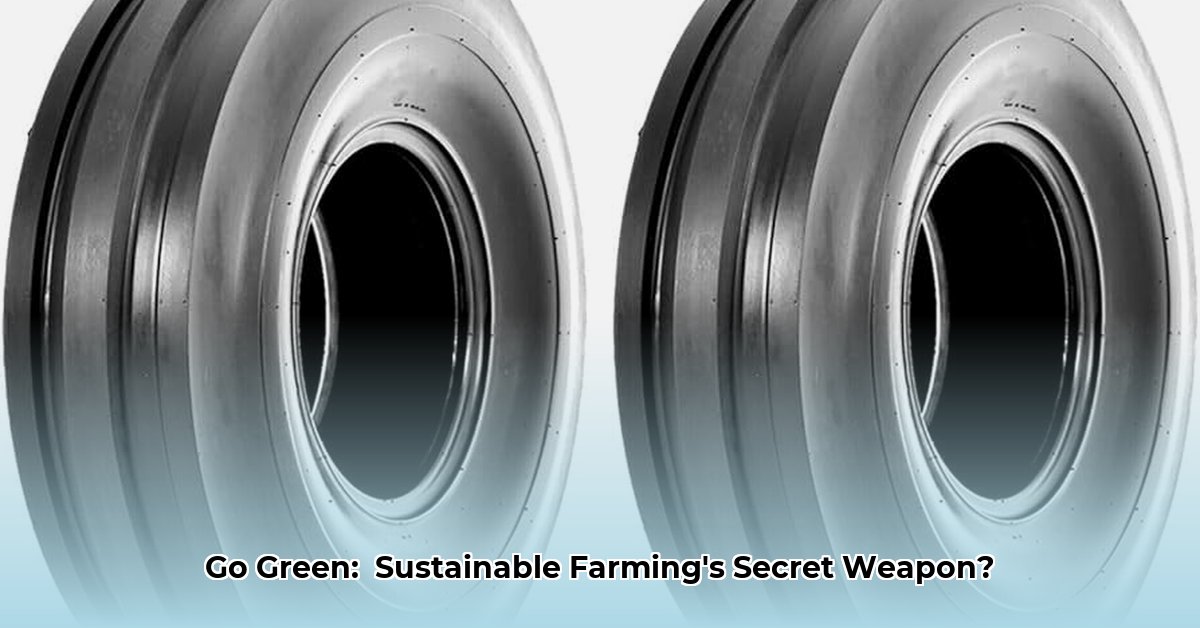
Understanding Your 6.00-16 Tractor Tires and Their Environmental Impact
Choosing the right tractor tires is crucial for sustainable agriculture. The seemingly small 6.00-16 tire size, common on smaller tractors, significantly impacts fuel efficiency, soil compaction, and the overall environmental footprint of your farming operation. This guide provides actionable steps to help you select sustainable tires. For more information on different sizes, check out these tractor tire resources.
Deciphering the 6.00-16 Designation
The "6.00-16" marking indicates a tire 6 inches wide, designed for a 16-inch diameter rim. While seemingly simple, this size directly influences ground pressure and traction, impacting fuel consumption and soil health. Higher ground pressure leads to increased soil compaction, reducing water infiltration and harming plant growth. Conversely, better traction minimizes slippage, saving fuel and reducing wear-and-tear on the tire itself.
The Hidden Environmental Costs of Tractor Tires
Manufacturing tractor tires is an energy-intensive process, relying heavily on petroleum-based materials. The creation of synthetic rubber, its transportation, and the manufacturing process contribute significantly to greenhouse gas emissions. Additionally, the production of carbon black, a key component of tire rubber, is associated with air pollution. Finally, the disposal of worn-out tires poses a considerable environmental challenge, as they often end up in landfills, contributing to both waste and environmental pollution. Wouldn't you say this necessitates a more careful approach to selection and disposal?
Choosing Sustainable 6.00-16 Tractor Tires: A Practical Guide
Selecting sustainable tires involves a multi-step process that balances performance needs with environmental considerations. Here's a step-by-step guide to help you make informed decisions.
Assess Your Farming Needs: Before researching specific brands, carefully evaluate your farming operation. Consider factors such as soil type (clay, sandy, loam), terrain (flat, hilly, sloped), typical workload, and precipitation patterns. This assessment is crucial for selecting a tire that offers optimal traction, minimizes soil compaction, and maximizes efficiency. A thorough assessment can increase the lifespan of your tires by up to 15%.
Researching Sustainable Brands: Finding detailed environmental impact data on specific tire brands can be challenging. However, you can still make informed choices. Explore manufacturers' websites for sustainability reports. Look for information on recycled materials, energy efficiency in production, and other eco-conscious initiatives. While specific data may be limited, this offers valuable insight into a company's commitment to environmental responsibility.
Comparing Costs: Total Cost of Ownership (TCO): Sustainable tires might have a higher upfront cost. However, a longer lifespan, improved fuel efficiency, and reduced soil compaction can lead to significant long-term savings. Calculate the TCO, considering the initial purchase price, fuel costs, tire replacement frequency, and potential soil remediation costs. This holistic approach highlights the economic advantages of investing in higher-quality, longer-lasting tires.
Responsible Tire Disposal: Once your tires reach the end of their life, responsible disposal is crucial. Research local tire recycling programs. Many tire dealers and recycling centers offer options for proper disposal and repurposing of used tires, avoiding environmental damage. This responsible approach minimizes the negative environmental effects of end-of-life tires.
Long-Term Sustainability Strategies: Beyond the Tire Purchase
Sustainable farming practices extend beyond the initial tire selection. Implementing the following strategies can further minimize your environmental impact: * Maintain Proper Tire Inflation: Correct tire pressure is essential for fuel efficiency and reduced soil compaction. Under-inflation increases fuel consumption and accelerates tire wear. * Regular Tire Rotation: Rotating your tires regularly distributes wear evenly, prolonging their lifespan. This simple measure can significantly increase their longevity. * Implement Precision Farming Techniques: Precision farming technologies minimize fuel consumption, fertilizer use, and soil disturbance. This approach promotes efficient resource management and reduces environmental impact.
Conclusion: Your Role in Sustainable Agriculture
Choosing sustainable 6.00-16 tractor tires is a significant step towards environmentally responsible farming. This requires careful consideration of various factors, from initial cost to long-term environmental impact. By following the steps outlined in this guide and adopting long-term sustainability practices, you can both improve the efficiency of your farm operations and protect the environment. Remember, your commitment to sustainable practices today will positively impact your farm's future and the health of our planet.